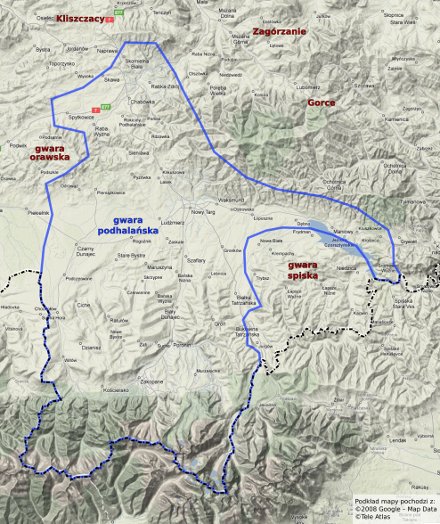Podhale (piedmont, literally: under the mountain meadows) dialect belongs to the dialects of Małopolska (Lesser Poland) mountain belt (see Małopolski dialect), which also includes: Spisz dialect in the east and Orawa and South-Żywiec dialects in the west. Podhale dialect is inherently variable, due to the size of the region (about 50 localities).
See the attached map outlining the extent of Podhale region.
To get some ideas what it is all about ,do this:
Open the following page (in Polish), gwarypolskie.uw.edu.pl/index.php?option=com_content&task=view&id=442&Itemid=43,
then follow the 16 properties of that dialect outlined there, keyed into this rough English explanation below. The little green triangles inside green squares invoke samples of speech, which characterize some of those 16 main properties listed.
1. "Mazurzenie" - pronounciation of consonants [sz cz ż dż] as [s c z dz]
2. Voiced inter-word phonetics - voicless consonants at the end of the first word become voiced if the second words starts with one of [r l ł m n]
3. Slanted vowels, continuation of ancient long vowels (as in Czech)
3.1 Slanted "a", a sound between "a" and "o". Dying sound, younger generation replace it by "o"
3.2 Slanted "o", a sound between "o" and "u"
3.3 Slanted "e", equivalent to vowel "y"
4. Nasal vowels (too complex to explain here ...)
5. Protetic vowels
a. Labialization
b. Aspiration
c. Pre-jotation (from Latin pre + jota) - inserting "j" in from of vowels in aspiration
6. Transition of suffix -ch to -k
7. Podhalan archaisms
8. transition of -ch to -k in numerals
9. Keeping old front-tongue £ (dark L), rare - mostly elder people
10. Keeping old "i" after the fricative "r", similar to Czech ři
11. Transition of -ił and -ył to -uł
12. Lack of transition e ==> o in front of consonants [t s] (as opposed to standard Polish)
13. Keeping the feminine suffix -e in dative
14. Morpheme -t- in passive participles, based on the roots of the past tense ending in slanted "a"
15. Frequent occurrence of suffixes -acka and -ba, forming names of actions
16. Initial stress (first syllable)
Now listen to the performance of "Siklawa" band from that region. "Mazurzenie" and the initial stress aside - the most striking features (at least for me) are the slanted vowels (outlined at point 3 above) as pronounced by sisters Danuta and Małgorzata Szeliga. Try the phrase "Takiegó Janicka serduskó by chciałó". Do you hear the o-u sounds, which I marked as ó?

Podhale region